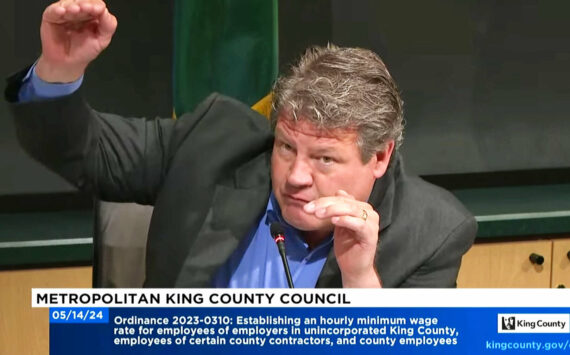THE SERIES OF running battles between activists trying to save what’s left of Ecotopia’s old-growth forest, and timber companies and loggers trying to save what’s left of their industry’s jobs is about to become a war—an ugly one. In the last two weeks, twin major declarations came from the Bush administration and a court in Eugene, Ore.
The tension has been building for years: Seattle’s anti-WTO protests were a global coming-out party for a determined radical direct-action movement largely birthed in the tree-sits of the Pacific Northwest. As activists’ numbers have increased, logging jobs have disappeared. By the mid-’90s, with salvage logging and Clinton’s infamous Northwest Forest Plan, the floodgates seemed to be open for the denuding of what little was left of the Northwest’s public lands. Clinton’s plan called for logging more than 900 million board feet of timber a year. But the logging has all but ground to a halt, the victim of court orders, lowered prices, and the grim fact that the easy, inexpensively logged timber is gone. This year, probably less than 100 million board feet will be logged.
Hence, timber companies’ joy last week when President Bush nominated Mark Rey to oversee the U.S. Forest Service as undersecretary of agriculture. Rey was a primary author of the Salvage Logging Plan. He worked for 18 years as a D.C. lobbyist for various logging industry trade groups.
The appointment is pretty typical for Dubya, who is amassing a long record in his less visible undersecretarial appointments of nominating industry stooges. But contrary to popular assumption, it’s not as though the Forest Service is in the business of protecting trees. The Forest Service is part of the Department of Agriculture for a reason: It considers trees on public lands a cash crop, and under someone like Rey, the pressure to find every possible means to circumvent or ignore court-ordered environmental protections will be enormous. Here come the activists.
In the 18 months between WTO and the recent Earth Liberation Front fires at two genetic engineering research sites in Seattle and Oregon, property damage has become a far more accepted tactic among many young radical activists. Hundreds of other Northwesterners have been radicalized by the lengthy direct actions in tree-sits at places like Oregon’s Fall Creek and Warner Creek.
In turn, law enforcement has grown more alarmed over such tactics. For instance, on June 11, 22-year-old Jeff “Free” Luers—who had admitted to starting a fire at a Eugene car dealership last June that destroyed three pickup trucks, causing $40,000 in damage—received a stunning sentence of 22 years and eight months in prison. No matter what you think of a young man torching pickup trucks in order to save the planet (at least he wasn’t blowing up secretaries), it can’t compare to the stupifying logic that Luers’ act of vandalism is somehow considered more threatening to society—and more deserving of punishment—than many murders.
MARTYRS AND CLEAR-CUTS
But property destruction notwithstanding, Luers and his allies are drawing their strategic assumptions from classically nonviolent protest, using the willingness of its practitioners to sacrifice as a basis for a moral appeal. They’re not firmly following the tradition of Mahatma Gandhi, in the sense that many avoid arrest and do not take public responsibility for their acts, but they have a life-engulfing sense of devotion to the Cause, and the movement thrives on martyrs. Repressive prison sentences rarely dissuade such activists from challenging the law; usually, if anything, it encourages more to come forward and put their lives on the line.
What will happen when, under the leadership of a harvest-at-all-costs administrator like Rey, the Forest Service begins auctioning off the sensitive habitats among the last of the old growth west of the Cascades (especially when timber companies are rushing to present a fait accompli to courts, and activists, hoping to block that, think that their actions are the difference between the forest’s survival and the devastation of an ecosystem)? Chances are there will be more, not fewer, serious attacks on property, and that more of them will move back into the woods. It’s not going to be pretty.
Of course, Rey’s nomination still needs to be confirmed. And there is no shortage in the Pacific Northwest of people working for a fair balance to be struck between a struggling industry and species, like the salmon, on the brink of extinction. But it doesn’t seem like the key decision makers are in that camp. Among the Northwest’s Senate Democrats, Sen. Ron Wyden of Oregon has already said he supports Rey. Sen. Patty Murray was a key figure in heading off congressional attempts to repeal Rey’s Salvage Logging Rider. And Maria Cantwell is the woman who, after winning her seat by campaigning against the ecological brutality of Slade Gorton’s gold mine, enthusiastically supported the nomination of Gorton soul mate Gail Norton to become secretary of the interior. With visionaries like these, it’s going to be a long summer.







